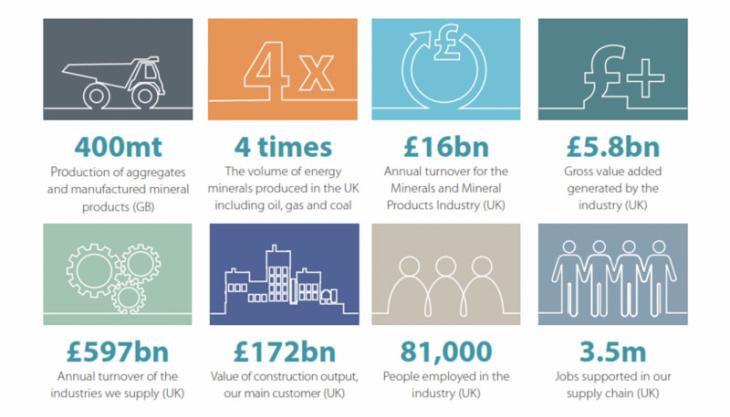Mineral products – an essential industry

400 million tonnes per annum confirms mineral products industry as UK’s biggest producer
A TOTAL of 400 million tonnes of essential aggregates, industrial minerals and other manufactured mineral products were produced in Great Britain in 2018, according to the latest figures published in ‘Profile of the UK Mineral Products Industry’, by the Mineral Products Association (MPA), making the sector the UK’s biggest producer by volume.
The latest edition of this publication and its supporting statistics are available to download from the MPA website. ‘Profile of the UK Mineral Products Industry’ sheds light on the breadth of the mineral products industry, from the diversity of the products and their uses, the scale of their markets, to their environmental and sustainability attributes.
The volume of aggregates, industrial minerals and other manufactured mineral products produced in Great Britain is four times that of UK energy minerals production. Aggregates for railways, asphalt for roads, mortar for homes, concrete for schools, hospitals and infrastructure, armour stone for coastal defences, industrial lime for drinking water, industrial sand for glass, and clays for ceramics are just some examples of the essential role minerals play in society. The industry supplies the necessary raw and manufactured mineral products to support future sustainable economic growth.
The mineral products industry directly contributed to the UK economy by generating more than £5.8 billion in gross value added in 2018, and a turnover of £16 billion. It also enabled a further £597 billion turnover in industries downstream in the supply chain. The industry employs 81,000 people directly at more than 2,000 active sites and plants, and supports an additional 3.5 million jobs throughout the supply chain.
The UK mineral products industry also plays an important role in the transition to a low-carbon and more circular economy, leading internationally in the use of recycled and secondary materials, decarbonization, and contributing to the delivery of national and local biodiversity targets and objectives.
‘Profile of the UK Mineral Products Industry’ provides readers with a unique source of information on an essential industry, illustrating the changing patterns in the way society produces and consumes minerals and the manufactured products derived from them. As government reduces support for data collection and consolidation relating to non-energy minerals, this review helps fill the gap.
MPA chief executive Nigel Jackson said: ‘The COVID-19 pandemic has emphasized the essential contribution minerals and mineral products make to the economy and our quality of life, and we welcomed recognition of this by the Government during the crisis.
‘Construction, including infrastructure and housing, is dependent upon mineral products, which are the largest supply, while many other manufacturing activities and strategic sectors, including utilities, also rely upon them.
‘Government ambitions to boost the economy as we recover from the impacts of Covid will rely upon a continuous, steady and adequate supply of essential minerals and mineral products if we are to build back at all, let alone better, greener and smarter. Now is the time for the Government to respond to the industry’s proposals for a national statement of need to confirm the industry as critical to national infrastructure, ensuring its future is hard-wired into future ambitions for the built environment. Supply cannot be assumed, it needs planning, monitoring and managing.
‘This publication provides a wealth of detail about mineral products that everyone in the UK needs, but too few understand. It helps to make the link between the raw materials and manufactured products that our industry is responsible for producing, and the diverse range of end uses that these support throughout the economy. Hopefully, this will help raise awareness of our sector’s essentiality to the economy and the UK.’









